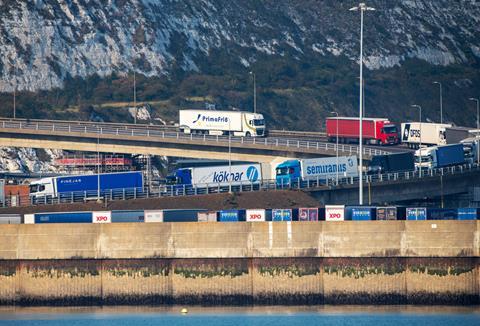France’s 48-hour ban on freight hauliers from Britain began last night in response to new covid-19 strain
Housebuilders could face extra costs after France shut its border with the UK for 48 hours last night in an attempt to contain a new, more contagious strain of covid-19.

EU member states are currently meeting to discuss a coordinated response after France stopped all passengers and any accompanied freight from the UK from crossing the border at 11pm last night.
The port of Cover has shut in response, while Eurotunnel said travel from the UK to France has also been suspended – although the route was still open for travel and goods coming in the opposite direction.
Construction Products Association economics director Noble Francis said delays at the border could exacerbate pressures on materials supplies which had already been building before the new restrictions were announced.
However, the impact on residential development is likely to be limited due to the usual two-week Christmas and New Year shutdown in work on most construction sites.
The crisis comes after the UK government put around 18 million people in London and the South East under stricter tier 4 lockdown rules on Saturday night following the emergence on Friday of the new variant of covid-19.
Flights from the UK have also been suspended in more than 30 countries including Germany, Italy, Belgium, Poland, India, Canada, Switzerland and Hong Kong.
Unaccompanied freight such as shipping containers is still able to be transported into the UK.
Noble Francis said: “Demand already exceeds supply for some imported products such as steel, timber, roofing products and white goods, given the sharp recovery in some areas of construction since the initial lockdown, so there has been little stockpiling and any further delays could mean an increase in costs and pushing out of lead times.”
But Francis added the late December slowdown in site activity could mean that major problems for construction would not be seen “immediately”, with those industries relying on just-in-time imports such as supermarkets and car manufacturers more likely to be hit.
“The largest impacts are at ports dealing with the most lorry traffic rather than shipping containers, which are ports on the south coast, primarily Dover. Most construction products arrive in the UK on the East coast and tend to be less reliant on lorry traffic from the EU,” he said.
However, Civil Engineering Contractors Association chief executive Alasdair Reisner warned that infrastructure works being carried out over the Christmas period “could be affected if there were to be supply chain disruptions”.
Cenkos analyst Kevin Cammack added: “I guess it’s lucky that the building trade basically shuts down for two weeks over Christmas giving a chance for some backlogs to potentially unwind and any transactional issues to be resolved.”
The crisis comes as the industry is braced for potential disruption to materials supply in January from the continued failure of the government to have secured a trade deal with the EU governing internaitonal trade after the end of the Brexit transition period which ends on December 31.
The French government said late this morning that it is looking to get freight moving into the UK within “the next few hours”, although it is not known how this will be managed.
Prime minister Boris Johnson on Saturday said people living in all 32 London boroughs and a string of neighbouring counties a stay at home order after covid infection levels were found to have soared over the past week, with the new covid strain blamed for the increase.











No comments yet